Unit 13 We’re trying to save the earth.期末知识梳理、习题加练、考点讲解练习
文档属性
| 名称 | Unit 13 We’re trying to save the earth.期末知识梳理、习题加练、考点讲解练习 | 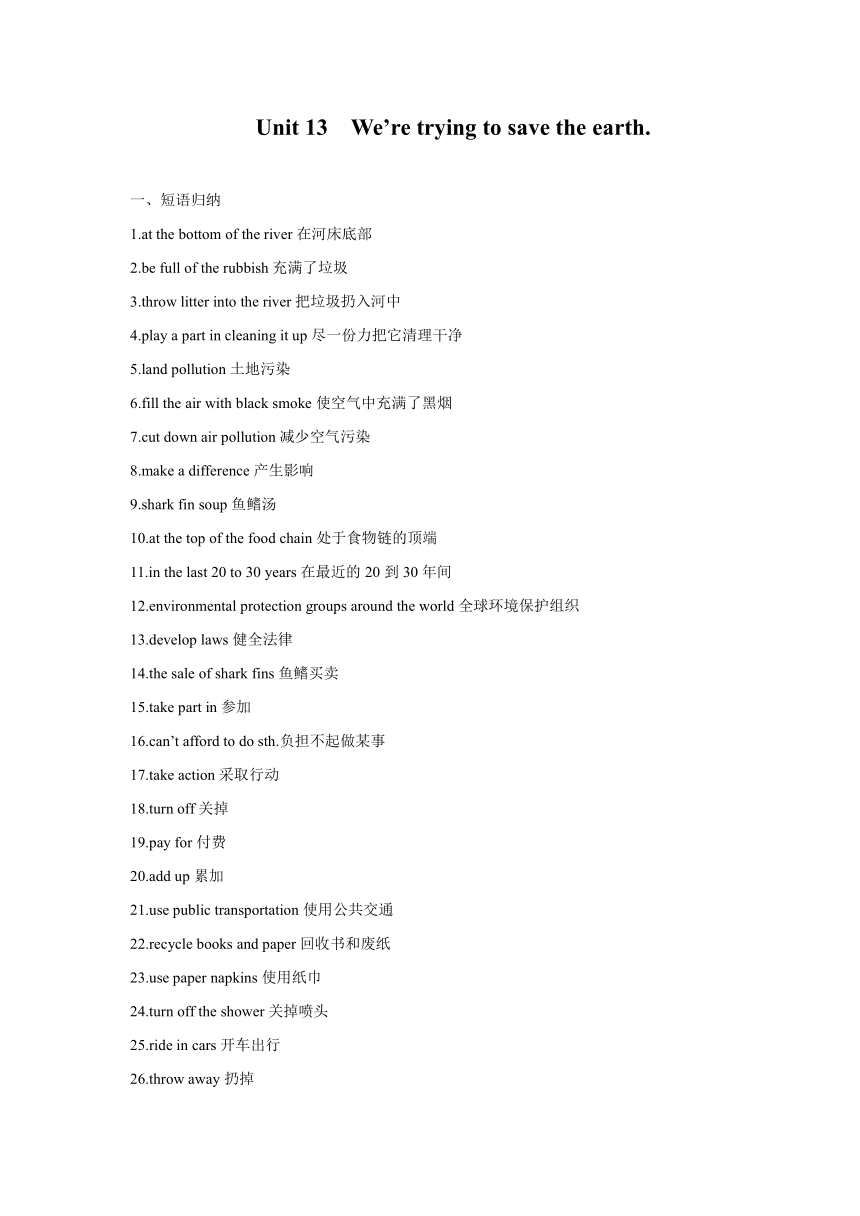 | |
| 格式 | zip | ||
| 文件大小 | 24.7KB | ||
| 资源类型 | 试卷 | ||
| 版本资源 | 人教新目标(Go for it)版 | ||
| 科目 | 英语 | ||
| 更新时间 | 2020-10-27 18:43:33 | ||
图片预览

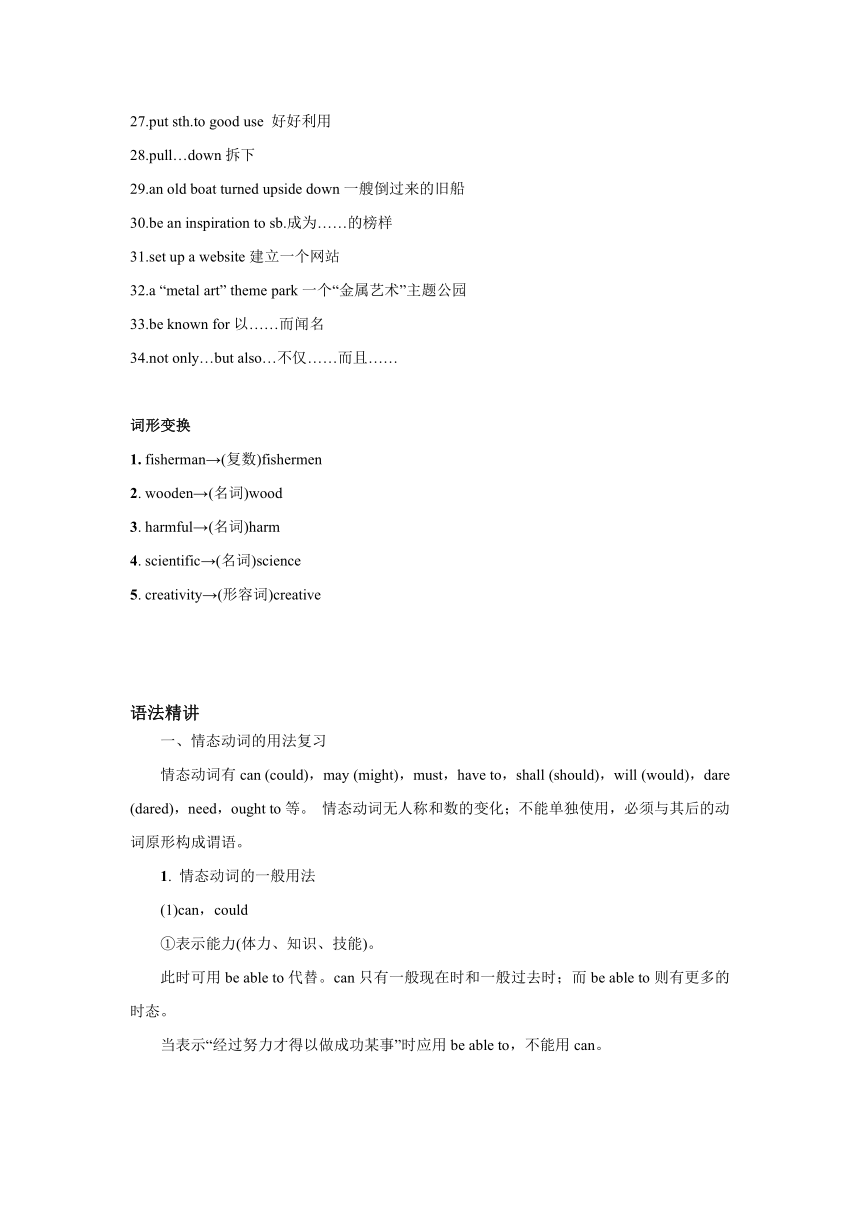
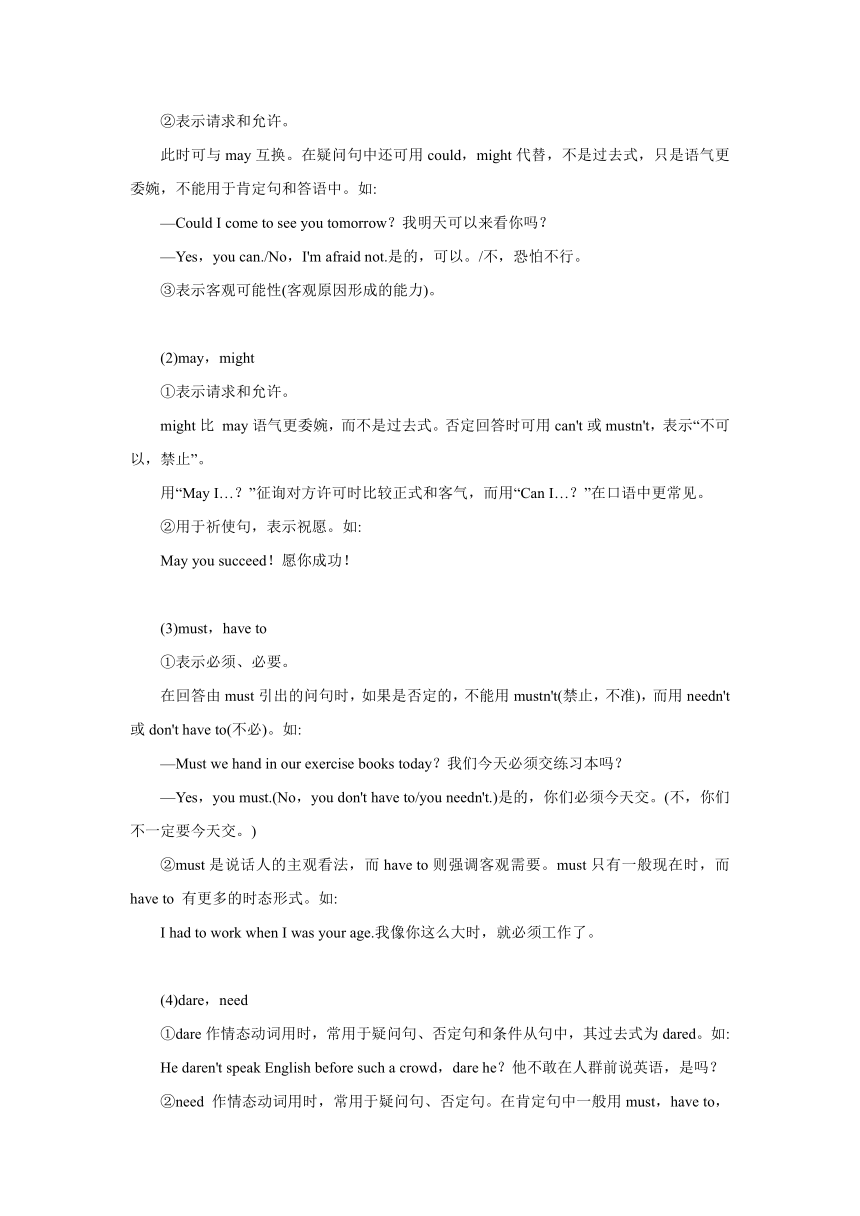
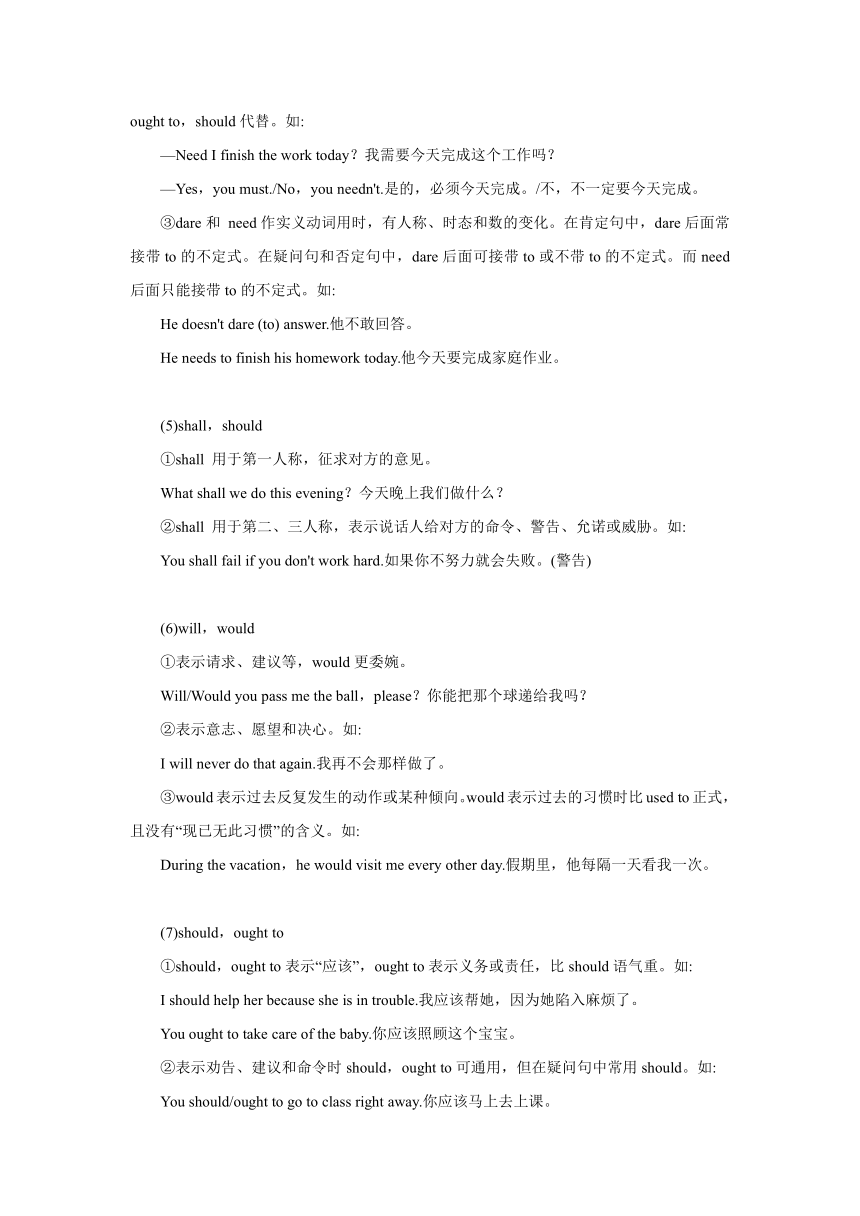
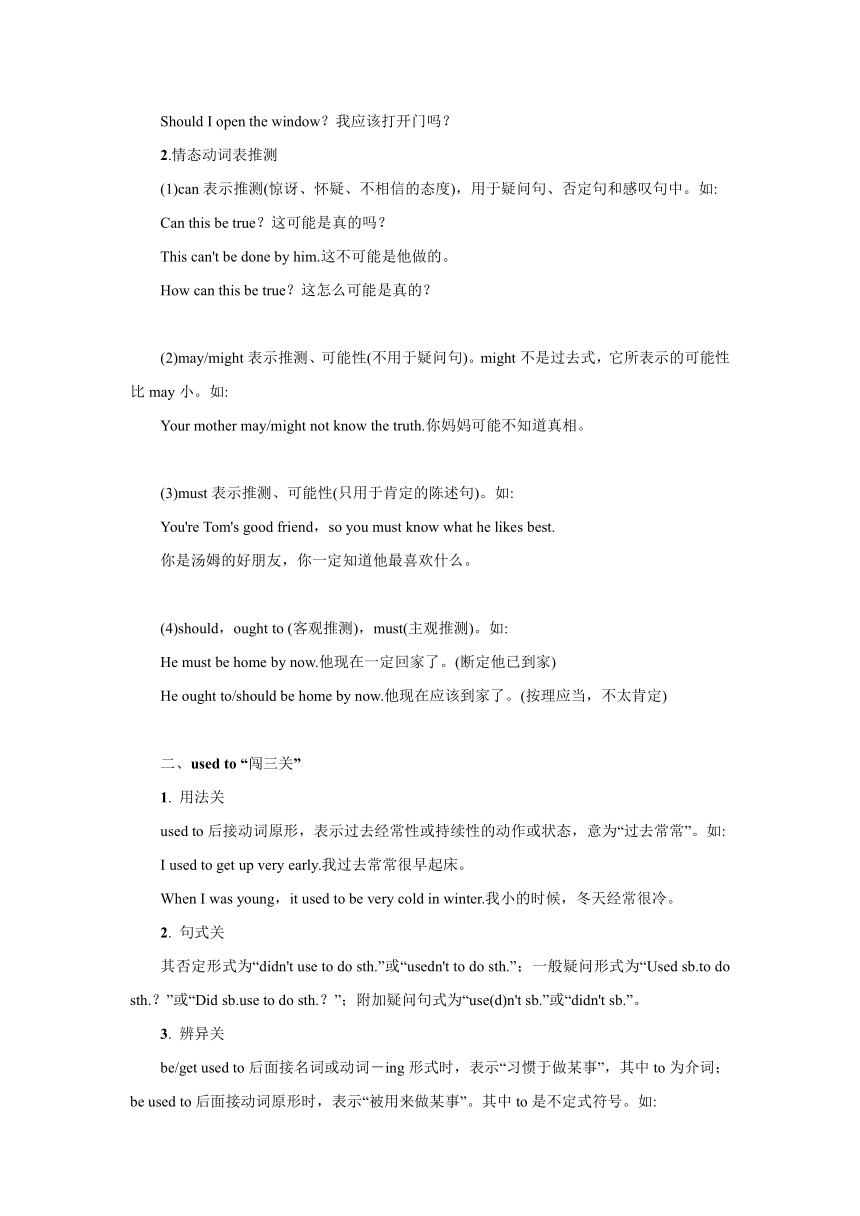
文档简介
Unit
13
We’re
trying
to
save
the
earth.
一、短语归纳
1.at
the
bottom
of
the
river在河床底部
2.be
full
of
the
rubbish充满了垃圾
3.throw
litter
into
the
river把垃圾扔入河中
4.play
a
part
in
cleaning
it
up尽一份力把它清理干净
5.land
pollution土地污染
6.fill
the
air
with
black
smoke使空气中充满了黑烟
7.cut
down
air
pollution减少空气污染
8.make
a
difference产生影响
9.shark
fin
soup鱼鳍汤
10.at
the
top
of
the
food
chain处于食物链的顶端
11.in
the
last
20
to
30
years在最近的20到30年间
12.environmental
protection
groups
around
the
world全球环境保护组织
13.develop
laws健全法律
14.the
sale
of
shark
fins鱼鳍买卖
15.take
part
in参加
16.can’t
afford
to
do
sth.负担不起做某事
17.take
action采取行动
18.turn
off关掉
19.pay
for付费
20.add
up累加
21.use
public
transportation使用公共交通
22.recycle
books
and
paper回收书和废纸
23.use
paper
napkins使用纸巾
24.turn
off
the
shower关掉喷头
25.ride
in
cars开车出行
26.throw
away扔掉
27.put
sth.to
good
use
好好利用
28.pull…down拆下
29.an
old
boat
turned
upside
down一艘倒过来的旧船
30.be
an
inspiration
to
sb.成为……的榜样
31.set
up
a
website建立一个网站
32.a
“metal
art”
theme
park一个“金属艺术”主题公园
33.be
known
for以……而闻名
34.not
only…but
also…不仅……而且……
词形变换
1.
fisherman→(复数)fishermen
2.
wooden→(名词)wood
3.
harmful→(名词)harm
4.
scientific→(名词)science
5.
creativity→(形容词)creative
语法精讲
一、情态动词的用法复习
情态动词有can
(could),may
(might),must,have
to,shall
(should),will
(would),dare
(dared),need,ought
to等。
情态动词无人称和数的变化;不能单独使用,必须与其后的动词原形构成谓语。
1.
情态动词的一般用法
(1)can,could
①表示能力(体力、知识、技能)。
此时可用be
able
to代替。can只有一般现在时和一般过去时;而be
able
to则有更多的时态。
当表示“经过努力才得以做成功某事”时应用be
able
to,不能用can。
②表示请求和允许。
此时可与may互换。在疑问句中还可用could,might代替,不是过去式,只是语气更委婉,不能用于肯定句和答语中。如:
—Could
I
come
to
see
you
tomorrow?我明天可以来看你吗?
—Yes,you
can./No,I'm
afraid
not.是的,可以。/不,恐怕不行。
③表示客观可能性(客观原因形成的能力)。
(2)may,might
①表示请求和允许。
might比
may语气更委婉,而不是过去式。否定回答时可用can't或mustn't,表示“不可以,禁止”。
用“May
I…?”征询对方许可时比较正式和客气,而用“Can
I…?”在口语中更常见。
②用于祈使句,表示祝愿。如:
May
you
succeed!愿你成功!
(3)must,have
to
①表示必须、必要。
在回答由must引出的问句时,如果是否定的,不能用mustn't(禁止,不准),而用needn't或don't
have
to(不必)。如:
—Must
we
hand
in
our
exercise
books
today?我们今天必须交练习本吗?
—Yes,you
must.(No,you
don't
have
to/you
needn't.)是的,你们必须今天交。(不,你们不一定要今天交。)
②must是说话人的主观看法,而have
to则强调客观需要。must只有一般现在时,而have
to
有更多的时态形式。如:
I
had
to
work
when
I
was
your
age.我像你这么大时,就必须工作了。
(4)dare,need
①dare作情态动词用时,常用于疑问句、否定句和条件从句中,其过去式为dared。如:
He
daren't
speak
English
before
such
a
crowd,dare
he?他不敢在人群前说英语,是吗?
②need
作情态动词用时,常用于疑问句、否定句。在肯定句中一般用must,have
to,ought
to,should代替。如:
—Need
I
finish
the
work
today?我需要今天完成这个工作吗?
—Yes,you
must./No,you
needn't.是的,必须今天完成。/不,不一定要今天完成。
③dare和
need作实义动词用时,有人称、时态和数的变化。在肯定句中,dare后面常接带to的不定式。在疑问句和否定句中,dare后面可接带to或不带to的不定式。而need后面只能接带to的不定式。如:
He
doesn't
dare
(to)
answer.他不敢回答。
He
needs
to
finish
his
homework
today.他今天要完成家庭作业。
(5)shall,should
①shall
用于第一人称,征求对方的意见。
What
shall
we
do
this
evening?今天晚上我们做什么?
②shall
用于第二、三人称,表示说话人给对方的命令、警告、允诺或威胁。如:
You
shall
fail
if
you
don't
work
hard.如果你不努力就会失败。(警告)
(6)will,would
①表示请求、建议等,would更委婉。
Will/Would
you
pass
me
the
ball,please?你能把那个球递给我吗?
②表示意志、愿望和决心。如:
I
will
never
do
that
again.我再不会那样做了。
③would表示过去反复发生的动作或某种倾向。would表示过去的习惯时比used
to正式,且没有“现已无此习惯”的含义。如:
During
the
vacation,he
would
visit
me
every
other
day.假期里,他每隔一天看我一次。
(7)should,ought
to
①should,ought
to表示“应该”,ought
to表示义务或责任,比should语气重。如:
I
should
help
her
because
she
is
in
trouble.我应该帮她,因为她陷入麻烦了。
You
ought
to
take
care
of
the
baby.你应该照顾这个宝宝。
②表示劝告、建议和命令时should,ought
to可通用,但在疑问句中常用should。如:
You
should/ought
to
go
to
class
right
away.你应该马上去上课。
Should
I
open
the
window?我应该打开门吗?
2.情态动词表推测
(1)can表示推测(惊讶、怀疑、不相信的态度),用于疑问句、否定句和感叹句中。如:
Can
this
be
true?这可能是真的吗?
This
can't
be
done
by
him.这不可能是他做的。
How
can
this
be
true?这怎么可能是真的?
(2)may/might表示推测、可能性(不用于疑问句)。might不是过去式,它所表示的可能性比may小。如:
Your
mother
may/might
not
know
the
truth.你妈妈可能不知道真相。
(3)must表示推测、可能性(只用于肯定的陈述句)。如:
You're
Tom's
good
friend,so
you
must
know
what
he
likes
best.
你是汤姆的好朋友,你一定知道他最喜欢什么。
(4)should,ought
to
(客观推测),must(主观推测)。如:
He
must
be
home
by
now.他现在一定回家了。(断定他已到家)
He
ought
to/should
be
home
by
now.他现在应该到家了。(按理应当,不太肯定)
二、used
to
“闯三关”
1.
用法关
used
to后接动词原形,表示过去经常性或持续性的动作或状态,意为“过去常常”。如:
I
used
to
get
up
very
early.我过去常常很早起床。
When
I
was
young,it
used
to
be
very
cold
in
winter.我小的时候,冬天经常很冷。
2.
句式关
其否定形式为“didn't
use
to
do
sth.”或“usedn't
to
do
sth.”;一般疑问形式为“Used
sb.to
do
sth.?”或“Did
sb.use
to
do
sth.?”;附加疑问句式为“use(d)n't
sb.”或“didn't
sb.”。
3.
辨异关
be/get
used
to后面接名词或动词-ing形式时,表示“习惯于做某事”,其中to为介词;be
used
to后面接动词原形时,表示“被用来做某事”。其中to是不定式符号。如:
I'm
used
to
walking
to
school
now.我现在习惯步行去学校。
语法练习:
Ⅰ.
用can,may,must,need,have
to的适当形式填空。
1.
You
________
return
the
book
to
the
library
on
time.
2.
I
________
(not)
find
the
way
to
the
hospital.________
you
show
me
the
way?
3.
—________
I
finish
the
work
right
now?
—No,you
________
(not).You
________
do
it
later.
4.
He
said
he
________
(not)
come
tonight.
5.
Her
mother
was
ill.
She
________
stay
at
home
and
look
after
her.
6.
It's
time
for
class.
You
________
stop
playing
football
or
you
________
be
late
for
class.
7.
The
cloud
is
lifting,so
it
________
(not)
be
a
rainy
day
tomorrow.
8.
The
desk
is
not
dirty.
You
________
clean
it.
9.
—What
is
your
mother
going
to
do
this
Saturday?
—I'm
not
sure.
She
________
go
to
see
my
grandmother.
10.If
the
traffic
light
is
red,you
________
cross
the
road.
It's
dangerous.
Ⅱ.
用括号内所给单词的适当形式填空。
11.
We
don't
need
________
(work)
today.
12.
He
doesn't
dare
________
(break)
his
promise.
13.
Some
students
are
used
to
________
(ask)
their
parents
for
help
when
they
meet
trouble.
14.
There
used
________
(be)
a
quiet
village
here.
15.
I
think
you
will
be
used
to
________
(live)
in
the
countryside.
16.
All
of
us
know
that
cotton
can
be
used
________
(make)
cloth.
17.
You
used
________
(go)
to
school
by
bike,didn't
you?
答案:
Ⅰ.
1.
must 2.
can't;Could 3.
Must;needn't;may 4.
couldn't 5.
had
to
6.must;may 7.
can't 8.
needn't 9.
may/might 10.
mustn't
Ⅱ.
11.
to
work 12.
to
break 13.
asking 14.
to
be 15.
living 16.
to
make 17.
to
go
课堂练习(1)
(一)
Environmental
problems
and
reasons:根据句意及汉语提示完成下列句子。
1.
The
river
used
to
be
clean,but
now
the
________
(底部)of
the
river
is
________
(充满
着)of
________
(垃圾).
2.
People
are
________
(乱扔)rubbish
in
the
river
and
factories
are
________
(倒入)waste
water
into
the
river.
That's
why
the
river
becomes
dirtier
and
dirtier.
As
a
result,there
is
no
more
fish
for
________
(渔民)to
catch.
3.
A
lot
of
________
(工业的)waste
water
comes
from
the
factories.
4.
People
use
a
large
number
of
________
(塑料)bags
every
day.
People
are
________
(扔)those
bags
everywhere.
This
turns
the
beautiful
cities
into
________
(丑陋的)
ones.
What's
worse,they
also
pollute
the
earth.
5.
The
factories
that
burn
________
(煤)pollute
the
air
with
a
lot
of
black
smoke.
The
air
________
(污染)is
getting
worse
and
worse.
6.
At
present,planes
are
widely
used
in
our
daily
life,which,however,makes
a
lot
of
________
(噪音).
7.
Many
animals
are
endangered
because
of
the
________
(残酷的)
hunting.
8.
We
aren't
able
to
see
stars
in
the
sky
just
like
before.
The
problem
is
that
people
use
too
much
________
(灯光).And
it's
also
________
(有害的)to
the
environment.
9.
Many
things
we
used
may
be
thrown
away
and
we
hardly
ever
________
(再利用)them.
10.
We
use
nice
paper
to
wrap
(包装)the
present.
Do
you
think
the
nice
paper
is
________(必
要)or
not?
答案:
1.
bottom;full;rubbish 2.
littering;pouring;fishermen 3.
industrial
4.plastic;throwing;ugly 5.
coal;pollution 6.
noise 7.
cruel
8.light;harmful 9.
recycle 10.
necessary
课堂练习(2)
Ⅰ.
根据句意及汉语提示填写单词。
1.
I
think
it's
________(残酷的)
of
them
to
shoot
the
animals.
2.
With
the
development
of
________(工业),it
will
cause
some
pollution
problems.
3.
The
thief
was
________(抓住)
by
the
police
last
night.
4.
You
will
be
punished
if
you
break
the
________(法律).
5.
________(鲨鱼)are
very
smart
animals.
Ⅱ.用括号内所给单词的适当形式填空。
6.
Hainan
is
in
the
________(south)
part
of
China.
7.
We
all
support
his
________(science)
research.
8.
This
is
an
________(danger)animal.
We
should
try
to
save
it.
9.
Smoking
is
________(harm)
to
your
health.
You
must
give
it
up.
10.
Tom
is
________(strong)
in
our
school.
Ⅲ.
根据汉语意思完成句子,每空一词。
11.
保护海洋生态系统食物链的平衡很重要。
It's
very
important
to
keep
the
balance
of
the
________
________
in
the
ocean
ecosystem.
12.
目前很多动物的数量在下降。
At
present
the
number
of
many
animals
________
________.
13.
他的中指在工作时不小心被机器切掉了。
His
middle
finger
________
accidentally
________
________
while
working.
14.
让我们拒绝鱼翅汤吧。因为保护鲨鱼就是保护我们自己
。
Let's
________
________
________
________
________
________
because
“to
protect
sharks
is
to
protect
ourselves”.
15.
听!贾森在练歌房里引吭高歌。
Listen!
Jason
is
singing
________
________
________
________
his
voice
in
the
singing
hall.
答案:
Ⅰ.
1.cruel
2.
industry 3.
caught 4.
laws 5.
Sharks
Ⅱ.
6.
southern 7.
scientific 8.
endangered 9.
harmful 10.
the
strongest
Ⅲ.
11.
food
chain 12.
is
dropping 13.
was;cut
off 14.
say
no
to
shark
fin
soup
15.
at
the
top
of
课后作业
题组训练一
cost,spend,take与pay
for辨析
Ⅰ.
单项选择。
(
)
1
.
—What
a
nice
table
computer!How
much
did
you
________
on
it?
—It
________
me
400
dollars.
A.
take;paid
B.
cost;took
C.
pay;spent
D.
spend;cost
(
)
2.
—Grandpa
has
changed
a
lot.
—So
he
has.
He
spends
more
time
than
he
used
to
________
games
with
the
children.
A.
play
B.
playing
C.
played
D.
plays
(
)
3.
Lily
________
30
yuan
for
the
album.
It
was
not
expensive.
A.
paid
B.
cost
C.
took
D.
spent
Ⅱ.
同义句转换,每空一词。
4.
She
spends
an
hour
reading
English
every
day.
It
________
her
an
hour
to
________
English
every
day.
5.
The
new
fridge
cost
me
2,000
yuan.
I
________
2,000
yuan
________
the
new
fridge.
题组训练二
afford的用法
Ⅰ.
单项选择。
(
)
1.
—What
do
you
think
of
the
4G
mobile
phone?
—I
really
like
it,but
I
can't
________
it.
A.
refuse
B.
stand
C.
pay
D.
afford
(
)
2.
Mr.White
is
out
of
work.
He
can't
________
his
son's
education.
A.
buy
B.
take
C.
afford
D.
pay
(
)
3.
Many
people
can't
afford
________
the
house.
A.
to
buy
B.
buy
C.
buying
D.
bought
Ⅱ.
根据汉语意思完成句子,每空一词。
4.
他的父母负担不起他的学费。
His
parents
couldn't
________
________
________
________
his
education.
5.
我抽不出一个小时去吃午饭。
I
can't
________
an
hour
________
lunch.
题组训练三
turn
off,turn
on,turn
up与turn
down辨析
Ⅰ.单项选择。
(
)
1.
—Do
you
know
the
latest
information
about
Flight
MH370?
—I've
no
idea.
Let's________
the
TV
to
watch
the
news
programme.
A.
turn
on
B.
turn
down
C.
turn
up
D.
turn
off
(
)
2.
)—Would
you
be
so
kind
as
to
________
your
music?
I
am
preparing
for
tomorrow's
speech.
—Sure.
Sorry
to
disturb
you.
A.
turn
down
B.
turn
up
C.
turn
on
D.
turn
off
(
)
3.
Bill,please________
your
computer
and
go
to
sleep.
It's
too
late.
A.
turn
on
B.
turn
off
C.
turn
up
D.
turn
down
Ⅱ.
根据汉语提示完成句子,每空词数不限。
4.
Would
you
please
________________(开大)
the
radio?
I
can't
hear
it
clearly.
5.
Mr.Black
________________
(打开)
the
TV
as
soon
as
he
got
home.
题组训练四
take
part
in与join辨析
Ⅰ.单项选择。
(
)
1.
—________
of
volunteers
will
be
needed
for
2014
International
Horticulture
Exposition
in
Qingdao.
—Let's
go
and
________
them.
A.
Thousands;join
B.
Thousand;be
a
member
of
C.
Three
thousand;take
part
in
D.
Thousands;be
in
(
)
2.
He
________
the
composition
contest
and
won
a
prize.
A.
took
part
in
B.
took
off
C.
took
out
D.
took
care
of
(
)
3.
—I
suppose
we'll
go
to
plant
trees
next
week.
—Terrific!
Planting
trees
is
a
lot
of
fun.
I'd
like
to
________
you.
A.
visit
B.
join
C.
follow
D.
meet
Ⅱ.
用take
part
in和join的适当形式填空。
4.
He
________
the
English
club
last
term.
5.
Why
didn't
you
________________
Jim's
party
yesterday?
答案:
一、Ⅰ.1-3
DBA
Ⅱ.4.
takes;read 5.
paid;for
二、Ⅰ.1-3 DCA
Ⅱ.4.
afford
to
pay
for 5.
afford;for
三、Ⅰ.1-3 AAB
Ⅱ.4.
turn
up 5.
turned
on
四、Ⅰ.1-3 AAB
Ⅱ.4.
joined
5.
take
part
in
13
We’re
trying
to
save
the
earth.
一、短语归纳
1.at
the
bottom
of
the
river在河床底部
2.be
full
of
the
rubbish充满了垃圾
3.throw
litter
into
the
river把垃圾扔入河中
4.play
a
part
in
cleaning
it
up尽一份力把它清理干净
5.land
pollution土地污染
6.fill
the
air
with
black
smoke使空气中充满了黑烟
7.cut
down
air
pollution减少空气污染
8.make
a
difference产生影响
9.shark
fin
soup鱼鳍汤
10.at
the
top
of
the
food
chain处于食物链的顶端
11.in
the
last
20
to
30
years在最近的20到30年间
12.environmental
protection
groups
around
the
world全球环境保护组织
13.develop
laws健全法律
14.the
sale
of
shark
fins鱼鳍买卖
15.take
part
in参加
16.can’t
afford
to
do
sth.负担不起做某事
17.take
action采取行动
18.turn
off关掉
19.pay
for付费
20.add
up累加
21.use
public
transportation使用公共交通
22.recycle
books
and
paper回收书和废纸
23.use
paper
napkins使用纸巾
24.turn
off
the
shower关掉喷头
25.ride
in
cars开车出行
26.throw
away扔掉
27.put
sth.to
good
use
好好利用
28.pull…down拆下
29.an
old
boat
turned
upside
down一艘倒过来的旧船
30.be
an
inspiration
to
sb.成为……的榜样
31.set
up
a
website建立一个网站
32.a
“metal
art”
theme
park一个“金属艺术”主题公园
33.be
known
for以……而闻名
34.not
only…but
also…不仅……而且……
词形变换
1.
fisherman→(复数)fishermen
2.
wooden→(名词)wood
3.
harmful→(名词)harm
4.
scientific→(名词)science
5.
creativity→(形容词)creative
语法精讲
一、情态动词的用法复习
情态动词有can
(could),may
(might),must,have
to,shall
(should),will
(would),dare
(dared),need,ought
to等。
情态动词无人称和数的变化;不能单独使用,必须与其后的动词原形构成谓语。
1.
情态动词的一般用法
(1)can,could
①表示能力(体力、知识、技能)。
此时可用be
able
to代替。can只有一般现在时和一般过去时;而be
able
to则有更多的时态。
当表示“经过努力才得以做成功某事”时应用be
able
to,不能用can。
②表示请求和允许。
此时可与may互换。在疑问句中还可用could,might代替,不是过去式,只是语气更委婉,不能用于肯定句和答语中。如:
—Could
I
come
to
see
you
tomorrow?我明天可以来看你吗?
—Yes,you
can./No,I'm
afraid
not.是的,可以。/不,恐怕不行。
③表示客观可能性(客观原因形成的能力)。
(2)may,might
①表示请求和允许。
might比
may语气更委婉,而不是过去式。否定回答时可用can't或mustn't,表示“不可以,禁止”。
用“May
I…?”征询对方许可时比较正式和客气,而用“Can
I…?”在口语中更常见。
②用于祈使句,表示祝愿。如:
May
you
succeed!愿你成功!
(3)must,have
to
①表示必须、必要。
在回答由must引出的问句时,如果是否定的,不能用mustn't(禁止,不准),而用needn't或don't
have
to(不必)。如:
—Must
we
hand
in
our
exercise
books
today?我们今天必须交练习本吗?
—Yes,you
must.(No,you
don't
have
to/you
needn't.)是的,你们必须今天交。(不,你们不一定要今天交。)
②must是说话人的主观看法,而have
to则强调客观需要。must只有一般现在时,而have
to
有更多的时态形式。如:
I
had
to
work
when
I
was
your
age.我像你这么大时,就必须工作了。
(4)dare,need
①dare作情态动词用时,常用于疑问句、否定句和条件从句中,其过去式为dared。如:
He
daren't
speak
English
before
such
a
crowd,dare
he?他不敢在人群前说英语,是吗?
②need
作情态动词用时,常用于疑问句、否定句。在肯定句中一般用must,have
to,ought
to,should代替。如:
—Need
I
finish
the
work
today?我需要今天完成这个工作吗?
—Yes,you
must./No,you
needn't.是的,必须今天完成。/不,不一定要今天完成。
③dare和
need作实义动词用时,有人称、时态和数的变化。在肯定句中,dare后面常接带to的不定式。在疑问句和否定句中,dare后面可接带to或不带to的不定式。而need后面只能接带to的不定式。如:
He
doesn't
dare
(to)
answer.他不敢回答。
He
needs
to
finish
his
homework
today.他今天要完成家庭作业。
(5)shall,should
①shall
用于第一人称,征求对方的意见。
What
shall
we
do
this
evening?今天晚上我们做什么?
②shall
用于第二、三人称,表示说话人给对方的命令、警告、允诺或威胁。如:
You
shall
fail
if
you
don't
work
hard.如果你不努力就会失败。(警告)
(6)will,would
①表示请求、建议等,would更委婉。
Will/Would
you
pass
me
the
ball,please?你能把那个球递给我吗?
②表示意志、愿望和决心。如:
I
will
never
do
that
again.我再不会那样做了。
③would表示过去反复发生的动作或某种倾向。would表示过去的习惯时比used
to正式,且没有“现已无此习惯”的含义。如:
During
the
vacation,he
would
visit
me
every
other
day.假期里,他每隔一天看我一次。
(7)should,ought
to
①should,ought
to表示“应该”,ought
to表示义务或责任,比should语气重。如:
I
should
help
her
because
she
is
in
trouble.我应该帮她,因为她陷入麻烦了。
You
ought
to
take
care
of
the
baby.你应该照顾这个宝宝。
②表示劝告、建议和命令时should,ought
to可通用,但在疑问句中常用should。如:
You
should/ought
to
go
to
class
right
away.你应该马上去上课。
Should
I
open
the
window?我应该打开门吗?
2.情态动词表推测
(1)can表示推测(惊讶、怀疑、不相信的态度),用于疑问句、否定句和感叹句中。如:
Can
this
be
true?这可能是真的吗?
This
can't
be
done
by
him.这不可能是他做的。
How
can
this
be
true?这怎么可能是真的?
(2)may/might表示推测、可能性(不用于疑问句)。might不是过去式,它所表示的可能性比may小。如:
Your
mother
may/might
not
know
the
truth.你妈妈可能不知道真相。
(3)must表示推测、可能性(只用于肯定的陈述句)。如:
You're
Tom's
good
friend,so
you
must
know
what
he
likes
best.
你是汤姆的好朋友,你一定知道他最喜欢什么。
(4)should,ought
to
(客观推测),must(主观推测)。如:
He
must
be
home
by
now.他现在一定回家了。(断定他已到家)
He
ought
to/should
be
home
by
now.他现在应该到家了。(按理应当,不太肯定)
二、used
to
“闯三关”
1.
用法关
used
to后接动词原形,表示过去经常性或持续性的动作或状态,意为“过去常常”。如:
I
used
to
get
up
very
early.我过去常常很早起床。
When
I
was
young,it
used
to
be
very
cold
in
winter.我小的时候,冬天经常很冷。
2.
句式关
其否定形式为“didn't
use
to
do
sth.”或“usedn't
to
do
sth.”;一般疑问形式为“Used
sb.to
do
sth.?”或“Did
sb.use
to
do
sth.?”;附加疑问句式为“use(d)n't
sb.”或“didn't
sb.”。
3.
辨异关
be/get
used
to后面接名词或动词-ing形式时,表示“习惯于做某事”,其中to为介词;be
used
to后面接动词原形时,表示“被用来做某事”。其中to是不定式符号。如:
I'm
used
to
walking
to
school
now.我现在习惯步行去学校。
语法练习:
Ⅰ.
用can,may,must,need,have
to的适当形式填空。
1.
You
________
return
the
book
to
the
library
on
time.
2.
I
________
(not)
find
the
way
to
the
hospital.________
you
show
me
the
way?
3.
—________
I
finish
the
work
right
now?
—No,you
________
(not).You
________
do
it
later.
4.
He
said
he
________
(not)
come
tonight.
5.
Her
mother
was
ill.
She
________
stay
at
home
and
look
after
her.
6.
It's
time
for
class.
You
________
stop
playing
football
or
you
________
be
late
for
class.
7.
The
cloud
is
lifting,so
it
________
(not)
be
a
rainy
day
tomorrow.
8.
The
desk
is
not
dirty.
You
________
clean
it.
9.
—What
is
your
mother
going
to
do
this
Saturday?
—I'm
not
sure.
She
________
go
to
see
my
grandmother.
10.If
the
traffic
light
is
red,you
________
cross
the
road.
It's
dangerous.
Ⅱ.
用括号内所给单词的适当形式填空。
11.
We
don't
need
________
(work)
today.
12.
He
doesn't
dare
________
(break)
his
promise.
13.
Some
students
are
used
to
________
(ask)
their
parents
for
help
when
they
meet
trouble.
14.
There
used
________
(be)
a
quiet
village
here.
15.
I
think
you
will
be
used
to
________
(live)
in
the
countryside.
16.
All
of
us
know
that
cotton
can
be
used
________
(make)
cloth.
17.
You
used
________
(go)
to
school
by
bike,didn't
you?
答案:
Ⅰ.
1.
must 2.
can't;Could 3.
Must;needn't;may 4.
couldn't 5.
had
to
6.must;may 7.
can't 8.
needn't 9.
may/might 10.
mustn't
Ⅱ.
11.
to
work 12.
to
break 13.
asking 14.
to
be 15.
living 16.
to
make 17.
to
go
课堂练习(1)
(一)
Environmental
problems
and
reasons:根据句意及汉语提示完成下列句子。
1.
The
river
used
to
be
clean,but
now
the
________
(底部)of
the
river
is
________
(充满
着)of
________
(垃圾).
2.
People
are
________
(乱扔)rubbish
in
the
river
and
factories
are
________
(倒入)waste
water
into
the
river.
That's
why
the
river
becomes
dirtier
and
dirtier.
As
a
result,there
is
no
more
fish
for
________
(渔民)to
catch.
3.
A
lot
of
________
(工业的)waste
water
comes
from
the
factories.
4.
People
use
a
large
number
of
________
(塑料)bags
every
day.
People
are
________
(扔)those
bags
everywhere.
This
turns
the
beautiful
cities
into
________
(丑陋的)
ones.
What's
worse,they
also
pollute
the
earth.
5.
The
factories
that
burn
________
(煤)pollute
the
air
with
a
lot
of
black
smoke.
The
air
________
(污染)is
getting
worse
and
worse.
6.
At
present,planes
are
widely
used
in
our
daily
life,which,however,makes
a
lot
of
________
(噪音).
7.
Many
animals
are
endangered
because
of
the
________
(残酷的)
hunting.
8.
We
aren't
able
to
see
stars
in
the
sky
just
like
before.
The
problem
is
that
people
use
too
much
________
(灯光).And
it's
also
________
(有害的)to
the
environment.
9.
Many
things
we
used
may
be
thrown
away
and
we
hardly
ever
________
(再利用)them.
10.
We
use
nice
paper
to
wrap
(包装)the
present.
Do
you
think
the
nice
paper
is
________(必
要)or
not?
答案:
1.
bottom;full;rubbish 2.
littering;pouring;fishermen 3.
industrial
4.plastic;throwing;ugly 5.
coal;pollution 6.
noise 7.
cruel
8.light;harmful 9.
recycle 10.
necessary
课堂练习(2)
Ⅰ.
根据句意及汉语提示填写单词。
1.
I
think
it's
________(残酷的)
of
them
to
shoot
the
animals.
2.
With
the
development
of
________(工业),it
will
cause
some
pollution
problems.
3.
The
thief
was
________(抓住)
by
the
police
last
night.
4.
You
will
be
punished
if
you
break
the
________(法律).
5.
________(鲨鱼)are
very
smart
animals.
Ⅱ.用括号内所给单词的适当形式填空。
6.
Hainan
is
in
the
________(south)
part
of
China.
7.
We
all
support
his
________(science)
research.
8.
This
is
an
________(danger)animal.
We
should
try
to
save
it.
9.
Smoking
is
________(harm)
to
your
health.
You
must
give
it
up.
10.
Tom
is
________(strong)
in
our
school.
Ⅲ.
根据汉语意思完成句子,每空一词。
11.
保护海洋生态系统食物链的平衡很重要。
It's
very
important
to
keep
the
balance
of
the
________
________
in
the
ocean
ecosystem.
12.
目前很多动物的数量在下降。
At
present
the
number
of
many
animals
________
________.
13.
他的中指在工作时不小心被机器切掉了。
His
middle
finger
________
accidentally
________
________
while
working.
14.
让我们拒绝鱼翅汤吧。因为保护鲨鱼就是保护我们自己
。
Let's
________
________
________
________
________
________
because
“to
protect
sharks
is
to
protect
ourselves”.
15.
听!贾森在练歌房里引吭高歌。
Listen!
Jason
is
singing
________
________
________
________
his
voice
in
the
singing
hall.
答案:
Ⅰ.
1.cruel
2.
industry 3.
caught 4.
laws 5.
Sharks
Ⅱ.
6.
southern 7.
scientific 8.
endangered 9.
harmful 10.
the
strongest
Ⅲ.
11.
food
chain 12.
is
dropping 13.
was;cut
off 14.
say
no
to
shark
fin
soup
15.
at
the
top
of
课后作业
题组训练一
cost,spend,take与pay
for辨析
Ⅰ.
单项选择。
(
)
1
.
—What
a
nice
table
computer!How
much
did
you
________
on
it?
—It
________
me
400
dollars.
A.
take;paid
B.
cost;took
C.
pay;spent
D.
spend;cost
(
)
2.
—Grandpa
has
changed
a
lot.
—So
he
has.
He
spends
more
time
than
he
used
to
________
games
with
the
children.
A.
play
B.
playing
C.
played
D.
plays
(
)
3.
Lily
________
30
yuan
for
the
album.
It
was
not
expensive.
A.
paid
B.
cost
C.
took
D.
spent
Ⅱ.
同义句转换,每空一词。
4.
She
spends
an
hour
reading
English
every
day.
It
________
her
an
hour
to
________
English
every
day.
5.
The
new
fridge
cost
me
2,000
yuan.
I
________
2,000
yuan
________
the
new
fridge.
题组训练二
afford的用法
Ⅰ.
单项选择。
(
)
1.
—What
do
you
think
of
the
4G
mobile
phone?
—I
really
like
it,but
I
can't
________
it.
A.
refuse
B.
stand
C.
pay
D.
afford
(
)
2.
Mr.White
is
out
of
work.
He
can't
________
his
son's
education.
A.
buy
B.
take
C.
afford
D.
pay
(
)
3.
Many
people
can't
afford
________
the
house.
A.
to
buy
B.
buy
C.
buying
D.
bought
Ⅱ.
根据汉语意思完成句子,每空一词。
4.
他的父母负担不起他的学费。
His
parents
couldn't
________
________
________
________
his
education.
5.
我抽不出一个小时去吃午饭。
I
can't
________
an
hour
________
lunch.
题组训练三
turn
off,turn
on,turn
up与turn
down辨析
Ⅰ.单项选择。
(
)
1.
—Do
you
know
the
latest
information
about
Flight
MH370?
—I've
no
idea.
Let's________
the
TV
to
watch
the
news
programme.
A.
turn
on
B.
turn
down
C.
turn
up
D.
turn
off
(
)
2.
)—Would
you
be
so
kind
as
to
________
your
music?
I
am
preparing
for
tomorrow's
speech.
—Sure.
Sorry
to
disturb
you.
A.
turn
down
B.
turn
up
C.
turn
on
D.
turn
off
(
)
3.
Bill,please________
your
computer
and
go
to
sleep.
It's
too
late.
A.
turn
on
B.
turn
off
C.
turn
up
D.
turn
down
Ⅱ.
根据汉语提示完成句子,每空词数不限。
4.
Would
you
please
________________(开大)
the
radio?
I
can't
hear
it
clearly.
5.
Mr.Black
________________
(打开)
the
TV
as
soon
as
he
got
home.
题组训练四
take
part
in与join辨析
Ⅰ.单项选择。
(
)
1.
—________
of
volunteers
will
be
needed
for
2014
International
Horticulture
Exposition
in
Qingdao.
—Let's
go
and
________
them.
A.
Thousands;join
B.
Thousand;be
a
member
of
C.
Three
thousand;take
part
in
D.
Thousands;be
in
(
)
2.
He
________
the
composition
contest
and
won
a
prize.
A.
took
part
in
B.
took
off
C.
took
out
D.
took
care
of
(
)
3.
—I
suppose
we'll
go
to
plant
trees
next
week.
—Terrific!
Planting
trees
is
a
lot
of
fun.
I'd
like
to
________
you.
A.
visit
B.
join
C.
follow
D.
meet
Ⅱ.
用take
part
in和join的适当形式填空。
4.
He
________
the
English
club
last
term.
5.
Why
didn't
you
________________
Jim's
party
yesterday?
答案:
一、Ⅰ.1-3
DBA
Ⅱ.4.
takes;read 5.
paid;for
二、Ⅰ.1-3 DCA
Ⅱ.4.
afford
to
pay
for 5.
afford;for
三、Ⅰ.1-3 AAB
Ⅱ.4.
turn
up 5.
turned
on
四、Ⅰ.1-3 AAB
Ⅱ.4.
joined
5.
take
part
in
同课章节目录
- Unit 1 How can we become good learners.
- Section A
- Section B
- Unit 2 I think that mooncakes are delicious!
- Section A
- Section B
- Unit 3 Could you please tell me where the restroom
- Section A
- Section B
- Unit 4 I used to be afraid of the dark.
- Section A
- Section B
- Unit 5 What are the shirts made of?
- Section A
- Section B
- Review of Units 1-5
- Unit 6 When was it invented?
- Section A
- Section B
- Unit 7 Teenagers should be allowed to choose their
- Section A
- Section B
- Unit 8 It must belong to Carla.
- Section A
- Section B
- Unit 9 I like music that I can dance to.
- Section A
- Section B
- Unit 10 You're supposed to shake hands.
- Section A
- Section B
- Review of Units 6-10
- Unit 11 Sad movies make me cry.
- Section A
- Section B
- Unit 12 Life is full of the unexpected
- Section A
- Section B
- Unit 13 We're trying to save the earth!
- Section A
- Section B
- Unit 14 I remember meeting all of you in Grade 7.
- Section A
- Section B
- Review of Units 11-14
